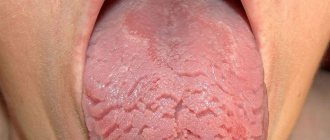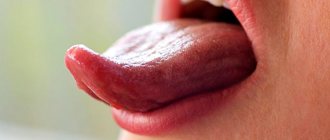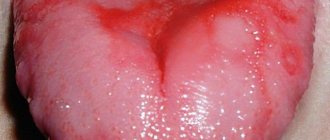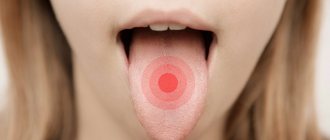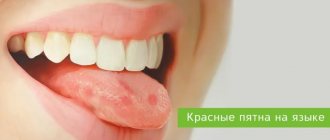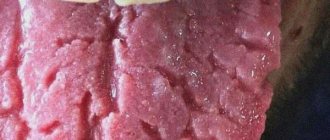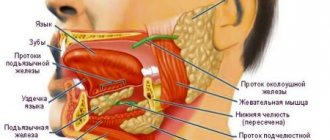Glossitis is a disease that affects the tongue and appears in the form of spots, inflammation and swelling, and severe itching. The reasons are an inadequate diet, irritating external factors, such as smoking, alcohol, certain toothpastes, or the habit of constantly sucking lollipops.
The disease takes such forms as:
- median rhomboid;
- folded;
- interstitial;
- black hairy;
- Gunter's;
- desquamative.
Based on duration and severity, acute and chronic forms are distinguished. In the first case, swelling, inflammation of the surface, changes in the color and structure of the tongue are observed. With chronic glossitis, papillomas, fungal growths, and severe pain can develop.
What is glossitis?
What do we know about the tongue as an organ? We know that it is located in the mouth, which helps us articulate and pronounce words correctly, helps us mix food, feel all the diversity of existing tastes, that they can be shown indignation, and in some African countries, a demonstration of it can be used to declare war.
Such a significant number of different physiological and social functions may one day be compromised. And the name of this threat is glossitis.
Despite the absolutely clear location of this organ, there are big questions about which doctor deals with its problems: a dentist, gastroenterologist, maxillofacial surgeon or otolaryngologist. This is not an easy question, and sometimes you can endlessly go from one specialist to another. But let's finally understand this intriguing matter.
Answers to popular questions about glossitis
Do I need to clean my tongue?
Yes, definitely.
A lot of microorganisms accumulate on the tongue, which leads to bad breath. In case of acute glossitis, the primary task is to relieve inflammation; you can use oral baths or rinses with antiseptic solutions (chlorhexidine, miramistin), a decoction of chamomile has a positive effect (has a calming effect on inflamed tissues of the mucous membrane of the tongue and the oral cavity as a whole). Also, do not forget about careful cleaning of the surface of the tongue.
There are special scrapers (semi-oval) for cleaning the tongue. They are designed to gently cleanse the tongue. Do not clean your tongue with brushes or spoons, as this can cause injury.
Which doctor should I contact to treat glossitis?
If tongue pathology is detected, you can consult a dentist. And, if necessary, the dentist will refer you for consultation to other specialists if this is due to the presence of a general disease.
What diagnostics are carried out before treating glossitis?
The specialist to whom the patient contacted conducts an examination of the oral cavity, collects a medical history, data on the general condition of the body (the presence of chronic organ diseases, etc.), prescribes tests, as well as laboratory diagnostics: a smear or culture of the oral cavity and tongue to determine pathogenic microflora.
Are glossitis inherited?
Yes, some forms can be inherited, for example, a folded tongue.
Is it possible to completely cure glossitis?
Some forms can be successfully treated, but often glossitis is a chronic and congenital disease. But with proper therapy, you can achieve minimal manifestations of the disease.
Forms and types of disease
Inflammation of our organ of taste occurs frequently and does not always manifest itself with symptoms, proceeding completely hidden from us.
There are several forms and types of the disease:
- According to the duration, the disease is divided into acute (develops quickly and lasts no more than a month) or chronic glossitis (lasts more than a month);
- According to the form of the lesion, the catarrhal form (proceeding with redness and swelling) and the desquamative form (proceeding with a change in appearance) are distinguished;
- purulent forms - phlegmon and abscess (a purulent focus in the thickness of the organ tissue itself);
- a separate group includes neurological diseases of the nerves innervating this organ.
Cellulitis and abscess occur acutely, they are associated with infection and require urgent surgical intervention. They manifest themselves as severe pain, chills and swelling of the lymph nodes of the neck - this form can be confused with acute inflammation of the salivary glands, so diagnosis using ultrasound and x-rays is needed. It is better not to delay these symptoms and seek medical help as an emergency.
The catarrhal form of glossitis manifests itself with a sharp blood supply - the tongue swells, becomes bright red - this can manifest itself, for example, with scarlet fever, or an allergic reaction, which, in addition to the organ of taste itself, spreads to the soft palate with the tongue. Treatment in this case is aimed at eliminating the allergic reaction and inflammation.
The largest and most heterogeneous group is desquamative glossitis. It is difficult to list the number of factors (external, internal) that can provoke this form of the disease. We will not make a mistake if we say that “the tongue is the mirror of the digestive tract.” Since it contains many nerve receptors and papillae of different shapes and purposes (filamentous, cone-shaped, mushroom-shaped, leaf-shaped, groove-shaped), a change in each link of its anatomy outwardly reveals a hidden disease. Let's take a little look at the most common diagnostic signs of these conditions.
Symptoms
Depending on the type of disease (and there are quite a few of them), typical signs will vary. Nevertheless, there are general symptoms that are similar for all forms.
First of all, glossitis changes the appearance of the tongue: growths that are dense to the touch are formed on it or areas are formed whose color differs from the healthy mucous membrane (the shade can vary from red to burgundy). In addition to visual changes, there are other symptoms:
- burning of the tongue, often accompanied by swelling;
- increased salivation;
- feeling of a foreign body in the mouth;
- changes in taste sensations (foods may acquire an unusual taste, sometimes a person becomes completely unable to perceive the taste of food);
- difficulty swallowing;
- change in diction (speech becomes slurred; in order to express a simple thought, a person has to make serious efforts, because due to pain it is difficult for the patient to pronounce words clearly).
If treatment is neglected, there is a high probability that the disease will enter the chronic stage: its onset is indicated by a change in the structure of the tongue and a noticeable increase in its size.
Changes in appearance depending on the disease
One of the common types is “geographical tongue,” in which its upper surface resembles a map with the borders of countries and continents. This is the most common form of glossitis, which does not manifest itself in any way and does not require medical intervention unless complications arise (numbness, burning). This form occurs in waves, provoked by rough or spicy food, and hormonal cyclic changes. But the loss of the pattern of the papillae may indicate the presence of hypo- or hyperacid gastritis (that is, with increased or decreased acidity of gastric secretions) - such symptoms are typical for patients with gastroesophageal reflux, when hydrochloric acid and bile are thrown from the stomach into the oral cavity.
"Geographical language"
The second most common type of glossitis is a folded tongue. This is an independent type of glossitis. In this case, the back of the tongue seems to be riddled with deep cracks and it feels like there are folds in it. This form of glossitis sometimes accompanies neurological diseases (for example, Melkerson-Rosenthal syndrome) and is present in people with acromegaly (hormone-active pituitary tumor).
"Folded tongue"
Also characteristic are manifestations of various anemias, which are reflected in the appearance of the organ: iron deficiency anemia can manifest itself as a burning sensation on the tip of the tongue, the appearance of cracks on it and an erased pattern of taste buds. Pernicious anemia (B12 deficiency), in which the tongue has a “varnished” appearance with a smooth, swollen surface, sometimes quite painful, with burning symptoms, is the main cause of Gunther-Miller glossitis.
"Lacquered Tongue"
A large group of pathological conditions of this organ are ENT-associated symptoms associated with chronic tonsillitis - here the symptoms are non-specific, ranging from a dirty coating on the tongue to manifestations of diphtheria with white masses that are difficult to remove.
They also distinguish the formation of ulcers on the tongue - aphthous glossitis, which, as a rule, has a viral cause and goes away on its own. This is a recurrent disease, with more frequent episodes it is necessary to exclude pathology of the immune system.
When visiting a doctor, you will often notice pronounced teeth marks on the side of the tongue - a sign of long-term swelling. This occurs in patients with enterocolitis, kidney disease and cardiovascular diseases. The reason for this condition is water retention in the body.
Imprints from teeth on the lateral surface of the tongue
In the presence of abundant white plaque, accompanied by pronounced redness of the oral mucosa, one should suspect a fungal infection, often of a candidal nature. In this case, HIV must be excluded. Also with HIV, “hairy leukoplakia” occurs, when the tongue appears to have white hairs on the side surface, similar to flames - this condition is specific to HIV.
"White Hairy Tongue"
It is worth noting the existence of a “black hairy tongue”, which is a symptom of gastrointestinal disorders, less commonly a fungus.
"Black Hairy Tongue"
As you can see, our organ of taste reflects deep processes in the body, and it is difficult to single out one specialist responsible for its treatment. It is worth involving doctors of different spectrum in therapy, conducting studies based on data from smears and blood tests. But what general recommendations can we, as doctors, give to patients?
Anatomy of the tongue
The tongue is divided into: body, apex and root. The tongue consists of muscles and is covered with epithelium. Also on the back of the tongue there are many special papillae with which we feel taste. The largest grooved papillae are located closer to the root of the tongue. In the center of the tongue there are filiform papillae, on the sides there are leaf-shaped papillae. And in front of the tongue there are mushroom-shaped papillae.
Care instructions
- Hygiene. We brush our teeth, but forget about our tongue. Thanks to advertising in the media, people are more likely to buy toothbrushes with a special brush for cleaning the tongue - and this is important. After all, bacteria live in the gap between the taste buds and food particles remain that must be removed from there.
- Caring for your oral health. Do not forget about the cleanliness of the palatine tonsils and the presence of reflux of gastric contents into the oral cavity.
- And the most important thing is to monitor your general health, undergo a timely examination by a doctor to identify the cause of inflammation - primarily to the dentist, but if you even consult a therapist or an infectious disease specialist, or an ENT doctor - you will not be mistaken, since there are almost no diseases, which would not affect such an important organ one way or another.
Prevention
Glossitis is easier to prevent than to treat. In order to avoid this unpleasant disease you need to follow simple rules.
The first is oral hygiene. This principle applies to both children and adults. If you wash your hands before eating, brush your teeth regularly, do not use someone else’s toothbrushes, and regularly sanitize your mouth, then the risk of developing tongue inflammation is minimal.
Try to avoid damaging the mucous membrane. Avoid eating hard foods that can damage your tongue, such as chips. Hot foods also cause epithelial defects. Spicy foods have an irritating effect. Abuse of them significantly worsens the condition of the tongue mucosa and increases the risk of infection.
Nicotine not only irritates the mucous membrane, but also impairs microcirculation, which reduces the resistance of the epithelium to the effects of infectious agents. Inflammatory diseases of the oral cavity are more common in smokers than in patients who are not adherents of this addiction. Strong alcoholic drinks also have a negative effect on the mucous membranes.
If you have symptoms of glossitis, do not self-medicate, contact a dental clinic. A competent specialist will determine the cause of the disease and prescribe treatment that will help quickly get rid of unpleasant symptoms. Remember, if glossitis is not treated, the disease can lead to serious complications and irreversible consequences.
How to treat
The treatment methods used will directly depend on the reasons that provoked the development of glossitis, so high-quality diagnosis comes to the fore.
It is impossible to say for sure which doctor treats glossitis, since it will depend, again, on the reasons that caused the disease: you should start by visiting a dentist, who, in turn, may need to consult a therapist and even a surgeon.
If glossitis is a consequence of diseases (syphilis, gastrointestinal problems, anemia), then it is necessary to eliminate these diseases.
To reduce pain, the doctor may recommend applying local lotions with Lidocaine, Pyromecaine and other anesthetics. This procedure can actually be carried out at home. In order to speed up recovery, the tongue is regularly cleaned of plaque with a cotton swab soaked in Chymotrypsin. If there are ulcers, lotions with Iruksol are prescribed. Traditional medicine methods are also allowed, for example, rinsing with a decoction of chamomile or soda, lubricating the affected areas with propolis and much more.
There are quite a few treatment options: the doctor will be able to choose the most effective one, so at the first signs of illness you should not delay visiting him.
Causes of glossitis in adults
There are many factors that lead to the occurrence of this pathology:
- infectious factor (viruses, bacteria, fungi);
- inflammatory gum diseases (periodontitis, gingivitis), carious teeth;
- poor oral hygiene;
- thermal, chemical burns;
- injury to the tongue with sharp objects, including sharp edges of fillings and dentures;
- smoking;
- reduced immunity.
Most often, patients have several factors that lead to
Glossitis: symptoms and treatment in adults
Contents:
What is glossitis
Symptoms of glossitis
Causes of glossitis in adults
Types of glossitis in adults
How and with what to treat glossitis in adults
Prevention of glossitis
Doctor's advice
Answers on questions
There are many factors that lead to pathologies in the oral cavity. Glossitis - what is it? This is a term that combines various diseases of the tongue.
